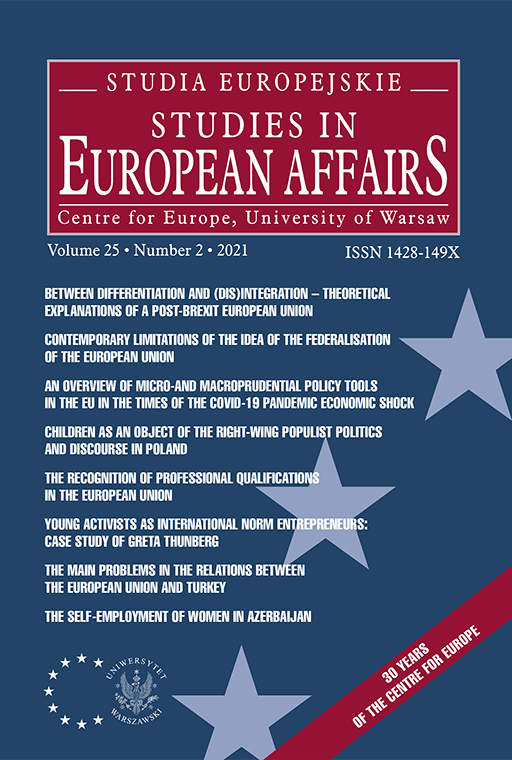
ISSUE: 2/2021
- Volume 25
- Number 2
- 2021
Subscribe NEWSLETTER
Studia Europejskie –
Studies in European Affairs
ISSN: 1428-149X
e-ISSN: 2719-3780
License
Articles published in the journal are under a Creative Commons Attribution – Non Commercial – No Derivatives 4.0 International License
The Main Problems in the Relations Between the European Union and Turkey
Abstract
This paper depicts the dynamics of the EU-Turkey relations beginning from the signing of the association agreement, i.e. the Ankara contract, to date. In addition, it aims to specify the factors preventing the bilateral collaboration and achievement of EU membership as aspired to by Ankara. The paper focuses on both the internal and international problems arising on Turkey’s path to EU membership, namely, the westernisation trend originating from Kemal Ataturk times, recent developments in Turkey, the democratisation of political institutions, the rule of law and protection of human rights, regional security, Turkey’s part in the refugee crisis, visafree travel, Greek-Turkey relationships, Ankara’s stance towards Cyprus, the Kurdish problem, and the Turkey-US and Turkey-Russia relationships. The authors discuss the EU Member States’ attitude towards the political and socio-economic developments in Turkey and the way Ankara looks at the requirements put forward by those Member States. We suggest several methods of rapprochement and brighter bilateral prospects.
References
Adamczyk A., The Influence of Turkey’s International Problems upon the Process of Its Integration with the European Union, in: Poland and Turkey in Europe – Social, Economic and Political Experiences and Challenges, eds. A. Adamczyk, P. Dubel, Centre for Europe University of Warsaw, Warsaw 2014.
Batiashvili Z., Cvlilebebi turqetis mmartvelobis sistemashi, „Eqspertis azri”, no. 107/2018.
Comission Staff Working Document, Turkey 2020 Report, Brussels, 6.10.2020, p. 9, https://ec.europa.eu/neighbourhood-enlargement/sites/near/files/turkey_report_2020.pdf (access 10.03.2021).
Demiral N., Positive agenda for Turkey-European Union relations: what will it bring or what will it take, „Procedia – Social and Behavioral Sciences”, no. 143/2014, DOI: https://doi.org/10.1016/j.sbspro.2014.07.545.
Esfahani H., Çeviker-Gürakar E., Fading attraction: Turkey’s shifting relationship with the European Union, „The Quarterly Review of Economics and Finance”, no. 53(4)/2013, DOI: https://doi.org/10.1016/j.qref.2013.10.001.
Findley C.V., Modern Türkiye Tarihi, Timas Yayinlari, İstanbul 2011.
Gachechiladze R., Saqartvelo msoplio konteqstshi: XX da XXI saukuneebis politikuri ckhovrebis ziritadi momentebi, Sulakauri Publishing, Tbilisi 2017.
Gadjiev A., Process Vstuplenia Turcii v ES i Kopengagenskie kriterii (Процесс Вступления Турции в ЕС и Копенгагенские Критерии, Современная Турция: Проблемы и Решения), in: Sowriemiennaja Turcja: Problemi i Reshenia, Sbornik Statei (Современная Турция: Проблемы и Решения Сборник Статей), Institute of the Middle East/ Institute of the Oriental Studies, Moscow 2006.
Haferlach L., et al., Foes. Frenemies? Unpacking the future of EU-Turkey Relations, „Futures”, no. 97/2018, DOI: https://doi.org/10.1016/j.futures.2017.04.006.
Inalcik H., Turkey and Europe in History, EREN Press, Istanbul 2016.
Karpat K., Kısa Türkiye Tarihi: 1800–2012, Timaş Yayınları, İstanbul 2012.
Kirac Z., et al., The United States of America Effect on Turkey-European Union Relations, „Procedia Economics and Finance”, no. 15/2014, DOI: https://doi.org/10.1016/S2212-5671(14)00643-1.
Komakhia M., Turqet-evrokavshiris urtiertoba, Saqartvelos strategiuli kvlevebisa da ganvitarebis centri, “Biuleteni”, no. 41/2000.
Kudriashova U., Perspektivi Dalneishego Sblijenia Turcii s Evropeiskim Souzom I Ego Posledstvia Dlia Rossii (Перспективы Дальнейшего Сближения Турции с Европейским Союзом и его последствия для России), „Востоковедный Сборник”, no. 8/2007.
Machitidze E., 1980-iani clebis turqeti da amerikis seertebuli statebi, narkvevebi turqetis istoriidan, Klio, Tbilisi 2018.
Makaradze E., Turqetis istoria 1918–2018 clebsi, Universali, Tbilisi 2019.
Regular Report on Turkey’s progress towards accession, COM(2004) 656 final, Brussels, 6.10.2004, https://ec.europa.eu/neighbourhoodenlargement/sites/near/files/archives/pdf/key_documents/2004/rr_tr_2004_en.pdf (access 10.03.2021).
Poland and Turkey in Europe – Social, Economic and Political Experiences and Challenges, eds. A. Adamczyk, P. Dubel, Centre for Europe University of Warsaw, Warsaw 2014.
Saatçioğlu B., et al., AB-Türkiye İlişkilerinin Geleceği: Çatışmalı İşbirliği ve Dinamik Ortaklık, „FEUTURE Sentez Çalışması” 2019.
Souleimanov E., Turqeti da evrokavsiri: Titqmis evropuli Turqeti, „Liberali”, no. 48, October 18, 2010.
Svanidze M., Turqetis istoria, Artanuji, Tbilisi 2007.
Turkey and Europe, ed. A. Szymański, The Polish Institute of International Relations, Warsaw, 2012.
https://1tv.ge/analytics/turqetis-evropuli-perspeqtivis-daisi/ (access 10.03.2021). https://www.aa.com.tr/en/europe/turkey-is-part-of-europe-and-will-bepart-
of-new-eu/2141014 (access 1.03.2021).
https://www.dw.com/en/eu-strongly-rejects-turkeys-use-of-migrants-atborder/a-52640976 (access 21.04.2021).
https://eeas.europa.eu/headquarters/headquarters-homepage/91878/euturkey-high-representativevice-president-josep-borrell-foreignminister-mevl%C3%BCt-%C3%A7avu%C5%9Fo%C4%9Flu-way_en (access 10.03.2021).
https://eeas.europa.eu/headquarters/headquarters-homepage/90861/way-ahead-after-difficult-2020-eu-turkey-relations-%C2%A0_en (access 1.03.2021).
http://www.euractiv.com.tr/yazici-sayfasi/article/davutoglu-abye-uyelikstratejik-tercih- olmaya-devam-ediyor-027749 (access 9.03.2021).
https://imedinews.ge (access 10.03.2021).
http://www.mfa.gov.tr/Turkiye_Nin-Kibris_La-Ilgili-Deklarasyonu_-29-Temmuz-2005.Tr.Mfa (access 10.03.2021).
https://www.worldometers.info/world-population/turkey-population/ (access 10.03.2021).
DOI: 10.33067/SE.2.2021.7
Language: English
Pages: 153-169
How to Cite:
Harvard
Chelidze, G. and Machitidze, E. (2021) "The Main Problems in the Relations Between the European Union and Turkey". Studia Europejskie – Studies in European Affairs, 2/2021, pp. 153-169. DOI: 10.33067/SE.2.2021.7